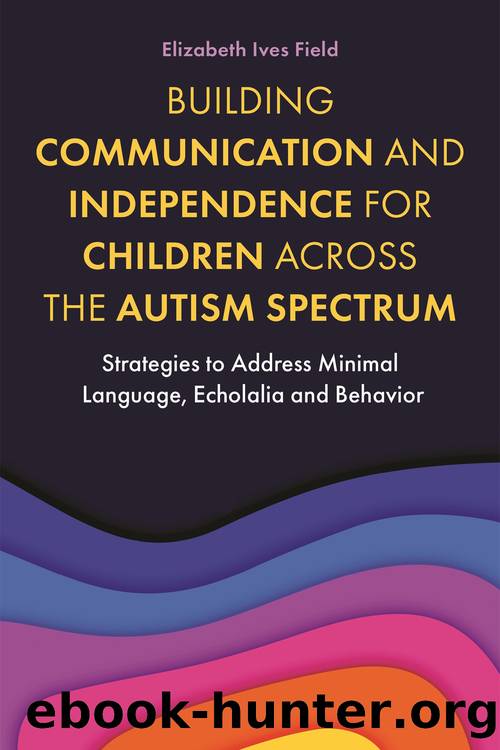Building Communication and Independence for Children Across the Autism Spectrum by Elizabeth Field

Author:Elizabeth Field
Language: eng
Format: epub
Publisher: Jessica Kingsley Publishers
Published: 2020-11-19T00:00:00+00:00
This is a sample; clearly some schools would have different options for acceptable responses when he is upset, and rewards would often be given at school instead of at home. Also, other specific examples could be added to the ânever okayâ list as they occur. Important features of the plan include:
⦠brief mention of the reason why a change is needed
⦠specific expectations of what to change
⦠what to do instead
⦠an incentive for trying to comply with the new expectations.
Goal #2: (a) Terek will converse with one other person, on a topic not chosen by him, until each person has had three conversational turns.
(b) When speaking on one of his favorite topics, Terek will tolerate another person adding to the conversation.
Develop a social narrative to use in speech/language therapy or individual instruction or home practice. Here is a sample:
Staying on the topic
In a conversation, people take turns talking. The topic of a conversation is the thing the people are talking about. If they are talking about trains, the topic is trains. If they are talking about swimming and suntan lotion and playing in the sand, the topic is the beach. If they are talking about pie and cake and pudding, the topic is⦠(Terek fills in dessert, sweets, etc.).
When two people have a conversation, both people do some of the talking. They usually keep talking about the same topic for several turns. We will practice having conversations where each of us takes three turns saying something about a topic. We will try to stay on the topic and not talk about other things.
We will choose the topic by turning over one of these cards. I will go first. If the card says âBirds,â I need to say something about birds. I might say âSome birds built a nest on my porch.â Then it is your turn. You need to say something about birds. You might say âWhat kind of birds were they?â or âMaybe they will lay eggs in the nest.â You can tell me something or ask a question, but it needs to be about birds, because birds are the topic of this conversation.
When we start, we will each have three plastic tokens. Each time we say something about birds we can put a token in this bowl. When all the tokens are in the bowl, we can keep talking about birds if we want or one of us can say âLetâs change the topicâ and choose another card from the pile.
After we have practiced with five topic cards, you can choose any topic you want to talk about, but we will still take turns saying things.
Download
This site does not store any files on its server. We only index and link to content provided by other sites. Please contact the content providers to delete copyright contents if any and email us, we'll remove relevant links or contents immediately.
| Behavioral Disorders | Communicative Disorders |
| Gifted Students | Inclusive Education |
| Learning Disabled | Mentally Disabled |
| Physically Disabled |
The Art of Coaching Workbook by Elena Aguilar(51165)
Trainspotting by Irvine Welsh(21643)
Twilight of the Idols With the Antichrist and Ecce Homo by Friedrich Nietzsche(18625)
Fangirl by Rainbow Rowell(9229)
Periodization Training for Sports by Tudor Bompa(8254)
Change Your Questions, Change Your Life by Marilee Adams(7761)
This Is How You Lose Her by Junot Diaz(6877)
Asking the Right Questions: A Guide to Critical Thinking by M. Neil Browne & Stuart M. Keeley(5761)
Grit by Angela Duckworth(5605)
Red Sparrow by Jason Matthews(5467)
Paper Towns by Green John(5179)
Room 212 by Kate Stewart(5105)
Ken Follett - World without end by Ken Follett(4723)
Housekeeping by Marilynne Robinson(4436)
The Sports Rules Book by Human Kinetics(4379)
Papillon (English) by Henri Charrière(4263)
Double Down (Diary of a Wimpy Kid Book 11) by Jeff Kinney(4261)
The Motorcycle Diaries by Ernesto Che Guevara(4089)
Exercise Technique Manual for Resistance Training by National Strength & Conditioning Association(4063)
